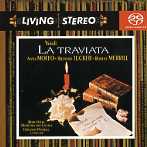This was the first Traviata I ever owned and I practically memorized it. I saw Anna Moffo on stage and adored her–she seemed so right as Violetta–and she’s positively lovely on this recording. I don’t even mind her tendency to slide up to notes, a trait that used to drive others crazy, yet it certainly isn’t as pronounced as Renée Fleming’s. Her “Ah! fors’e lui” is gentle and introspective, and she takes in the coloratura of “Sempre libera” with ease; her second-act duet with Germont is warm and nicely tinged with sadness. She lacks the power for the bigger outbursts later, but it doesn’t spoil her reading. Of course, if you compare her with a truly insightful soprano like Callas or Sills or the surprisingly touching Cotrubas, she’ll come up short; but on her own terms, her Violetta is a fine one indeed.
Richard Tucker is his usual beefy self; the voice is splendid, but subtlety is lacking, and his habit of exploding on notes for emphasis, especially in his angry mode, is as repellent now as it was 40 years ago. As ever, Robert Merrill has a voice we might bathe in–it’s a perfect, warm Verdi baritone with exactly the right range of comfort; but listen carefully and the emptiness in his head is abundantly clear. Fernando Previtali’s leadership is natural, forwardly propelled, and well-judged, but he misses some of the opera’s touching, more heartfelt moments, such as the last half of “Un di felice”, where he just keeps going and going without any nuance. RCA’s sonics–very fine then–are just as good now. So this is for Moffo fans–and she had many; but once you’ve heard Callas, it all seems a little rote. [9/18/2006]
































